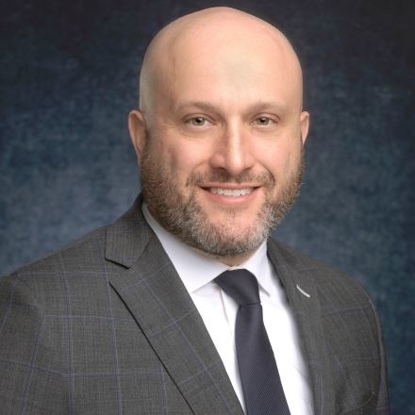
Norfolk Traumatic Brain Injury Lawyers
Helping Victims of TBI in Norfolk, VA
Traumatic brain injuries, caused by head trauma that damages your brain, range from mild to severe. Brain injuries are more common than you may think: more than 1.4 million Americans sustain a traumatic brain injury (TBI) each year, many of them in preventable accidents caused by someone else's negligence.
When you or someone you love has suffered a traumatic brain injury (TBI), you need an experienced attorney who can help you understand your legal rights and options. At Kalfus & Nachman PC, our Virginia traumatic brain injury lawyers have been helping victims of serious injuries for over 45 years. We know how to build a strong case on your behalf and fight for the maximum compensation you are owed.
Call (855) 880-8163 or contact us online today to schedule a free consultation with our Norfolk brain injury attorneys.
What is Traumatic Brain Injury?
Traumatic brain injury (TBI) is a type of brain injury that occurs when an external force causes the brain to become damaged. This can happen in a variety of ways, including in car accidents, falls, and sports injuries. TBI is a serious condition that can result in long-term or permanent damage, including cognitive, physical, and emotional impairments.
There are three main types of traumatic brain injury:
- Mild TBI: Also known as a concussion, mild TBI is the most common type of brain injury. It is often caused by a blow to the head or a violent shaking of the head and neck. Mild TBI can cause temporary changes in brain function, including headaches, confusion, and memory problems.
- Moderate TBI: This type of brain injury is characterized by a loss of consciousness for up to several hours. Moderate TBI can cause long-term or permanent physical or cognitive impairments.
- Severe TBI: This is the most serious type of brain injury and is characterized by a loss of consciousness for more than 24 hours. Severe TBI can cause long-term or permanent physical or cognitive impairments.
Common types of brain injuries include:
- Concussion: A mild form of TBI caused by a blow to the head or violent shaking. Symptoms can include confusion, memory problems, and headaches.
- Contusion: A bruise on the brain's surface often caused by a direct impact to the head.
- Coup-Contrecoup Injury: This injury occurs when the force of an impact causes the brain to move within the skull, resulting in contusions on both the side of the impact (coup) and the opposite side (contrecoup).
- Diffuse Axonal Injury (DAI): This type of injury involves widespread damage to nerve fibers in the brain, typically resulting from rapid deceleration or rotation of the head. It can lead to coma or severe impairment.
- Penetrating Brain Injury: This type of injury occurs when an object, such as a bullet or a sharp object, penetrates the skull and damages brain tissue. The severity depends on the location and extent of the injury.
- Hypoxic-Ischemic Brain Injury: Hypoxia occurs when the brain doesn't receive enough oxygen, and ischemia occurs when blood flow to the brain is restricted. These injuries can result from various causes, such as near-drowning, cardiac arrest, or respiratory failure.
- Shaken Baby Syndrome: Infants and young children are particularly vulnerable to brain injuries when violently shaken. This can cause bleeding, swelling, and damage to the brain.
- Anoxic Brain Injury: Anoxia is a complete lack of oxygen to the brain, which can result from various conditions like suffocation, carbon monoxide poisoning, or severe asthma attacks. Anoxic brain injury can have serious consequences, especially if oxygen deprivation lasts for an extended period.
- Encephalitis and Meningitis: Infections of the brain (encephalitis) or the membranes surrounding the brain and spinal cord (meningitis) can lead to inflammation and damage to brain tissue.
What are the Symptoms of Traumatic Brain Injury?
It is not uncommon for the symptoms of TBI to be delayed, meaning they do not appear until days or even weeks after the injury occurs. This is why it is so important to seek medical attention after any type of head injury, even if you do not think it is serious.
Some of the most common symptoms of TBI include:
- Headache
- Nausea or vomiting
- Difficulty sleeping
- Feeling tired or fatigued
- Blurred vision
- Ringing in the ears
- Changes in mood or mood swings
- Difficulty concentrating
- Memory problems
- Sensitivity to light or sound
- Loss of consciousness
- Convulsions or seizures
- Clear fluids draining from the nose or ears
If you or someone you love has suffered a blow to the head or a violent shaking of the head and neck, it is important to seek medical attention right away. Even if you do not think the injury is serious, you should still see a doctor. If you experience any of the symptoms of TBI in the days or weeks following the injury, you should see a doctor as soon as possible.
How is Traumatic Brain Injury Treated?
The treatment for TBI will depend on the severity of the injury and the symptoms you are experiencing. In some cases, TBI can be treated with medication and rest. In other cases, surgery may be required to repair the damage to the brain.
Some of the most common treatments for TBI include:
- Medication to control seizures, reduce swelling in the brain, and prevent blood clots
- Diuretics to reduce the amount of fluid in tissues
- Physical therapy to help regain lost motor skills and coordination
- Occupational therapy to help regain the ability to perform daily activities
- Speech and language therapy to help regain lost communication skills
- Psychological counseling to help manage the emotional and psychological symptoms of TBI
If you or someone you love has suffered a traumatic brain injury, it is important to seek medical attention right away. The sooner you receive a diagnosis and begin treatment, the better your chances of making a full recovery.
Can You Sue for Traumatic Brain Injury?
If you or someone you love has suffered a traumatic brain injury due to the negligence of another person or party, you may be entitled to compensation. This can include compensation for your medical expenses, lost wages, pain and suffering, and more.
At Kalfus & Nachman PC, we handle all types of traumatic brain injury claims, including those involving:
- Car accidents
- Truck accidents
- Motorcycle accidents
- Pedestrian accidents
- Bicycle accidents
- Slip and falls
- Workplace accidents
- Defective products
- Medical malpractice
- And more
Our Norfolk traumatic brain injury attorneys can help you understand your legal rights and options. We can investigate the circumstances surrounding your injury, gather evidence, and build a strong case on your behalf. We are not afraid to take on large insurance companies and corporations, and we will fight tirelessly for the maximum compensation you are owed.
How Much is a Traumatic Brain Injury Worth?
The value of a traumatic brain injury claim will depend on a variety of factors, including the severity of the injury and the impact it has on the victim’s life. In general, the more severe the injury, the more the claim will be worth.
Some of the most common types of compensation available in a traumatic brain injury claim include:
- Medical expenses
- Lost wages
- Loss of earning capacity
- Pain and suffering
- Emotional distress
- Loss of enjoyment of life
- Loss of consortium
- And more
Our Virginia traumatic brain injury attorneys can help you understand the value of your claim and fight for the maximum compensation you are owed.
How Our Norfolk Traumatic Brain Injury AttorneysCan Help
At Kalfus & Nachman PC, we know how to build a strong case on your behalf and fight for the maximum compensation you are owed. We have been helping victims of serious injuries for over 45 years, and we have a proven track record of success. We are not afraid to take on large insurance companies and corporations, and we will fight tirelessly for you.
When you choose us to handle your traumatic brain injury claim, you can expect:
- Compassionate, personalized service: We know how difficult it can be to suffer a traumatic brain injury. We will be there for you every step of the way, answering your questions and addressing your concerns.
- Aggressive representation: We will not back down from a fight. Our attorneys are skilled negotiators and litigators, and we will fight tirelessly for the maximum compensation you are owed.
- Proven results: We have a proven track record of success. We have recovered millions of dollars for our clients, and we can help you, too.
Contact our Norfolk brain injury lawyers today at (855) 880-8163 today to schedule a free consultation.
Brain Injury FAQs
How common is traumatic brain injury?
According to a report published by the National Center for Injury Prevention and Control, there are approximately 235,000 serious brain injuries in the United States each year. In Virginia, studies show that one in every 50 people who suffer a traumatic brain injury requires lifelong care.
Is a traumatic brain injury always dangerous?
Any kind of impact on the brain is potentially dangerous, although it is usually impossible to predict how much damage has been caused during an accident. TBI cases can become apparent only after a considerable length of time after the initial accident because neurological function changes can be subtle. It is difficult to assess how a TBI victim will react over some time; some make a quick recovery, and others are left facing much more severe consequences
What are the possible long-term effects and costs of TBI?
TBI may be responsible for a wide range of changes in the individual’s physical and mental health, including:
- Complete or partial paralysis
- Sensory loss or impairment
- Loss of sexual function
- Blackouts
- Memory problems
- Learning difficulties
- Depression
TBI can affect any of the brain’s activities and functions over the long term, including language, movement, thinking, and emotions. These effects may get better or worse over time. Patients may even need long-term assistance to perform daily tasks.
Long-term medical care and daily assistance are very expensive, especially when the TBI patient is unable to work due to his or her injury. Nationally, TBI-related costs add up to tens of billions of dollars. Therefore, you may need a lawyer with knowledge of brain injury cases to help you get compensation now for these long-term costs.
It is not just the TBI patient who suffers in cases where long-term medical care is needed. The financial pressures on family members from supporting a long-term TBI patient can be devastating. Moreover, the psychological and behavioral changes associated with brain injuries may put stress on even the healthiest family relationships.
Does one have to lose consciousness to suffer a traumatic brain injury?
No. Although losing consciousness immediately or shortly after a blow to the head is a bad sign, many people suffer traumatic brain injuries without ever losing consciousness.
When should I seek medical attention for a blow to the head?
It is impossible to tell which head impacts will result in brain injury. You may be susceptible to a brain injury even if you wear a helmet or hard hat. If the jolt felt serious, if you experience any symptoms of brain injury, or if you feel generally unwell, it is best to seek medical attention. Because of the potentially serious consequences, it is better to see the doctor unnecessarily than miss detecting a lethal brain injury until it is too late.
How long does it take for symptoms of brain injury to show up?
Some symptoms of serious brain injury are immediately apparent, but others may take days, weeks, months, or years to show up. Studies have shown that if you suffer a second minor head injury within a short period of time, your chances of experiencing serious brain injury increases dramatically.
Does a normal MRI following a blow or jolt to the head mean I have escaped traumatic brain injury?
Not necessarily. Although MRIs are capable of detecting some types of brain injury, they cannot rule out the possibility of brain injury. In fact, a recent study showed that MRIs were able to detect abnormal brain function in only 18% of subjects with post-concussive psychiatric symptoms, compared to 40% detection using single photon emission computed tomography (SPECT) and 86% using the experimental technique magnetoencephalography (MEG).
How can I protect myself from traumatic brain injury?
The best way to protect yourself is to exercise caution when doing any activity that may result in traumatic brain injury. Wear protective gear while participating in sports, especially when motorcycling, biking, or skiing. If you work in a construction site or other hazardous workplace, where a hard hat or other safety gear. When buying a car, consider the results of crash safety tests to determine whether brain injury is likely following an auto accident.
When should I consult a Norfolk brain lawyer about an injury?
It is best to contact a lawyer as soon as you or someone you love has been involved in a traumatic event, such as an auto accident or slip and fall and you received any type of blow to the head. This allows you to learn more about your options and avoid accidentally compromising your rights.
Where can I get legal advice on traumatic brain injury?
Contact a qualified Norfolk brain injury attorney at the Virginia law firm of Kalfus & Nachman PC for a free review of your case. Our personal injury lawyers have represented TBI victims in Norfolk, Hampton, Newport News, Portsmouth, Roanoke, Virginia Beach, and other communities.

How Is Kalfus & Nachman Different?
-
You Will Pay No Fees Unless We Win Your Case
-
We Have Recovered Millions of Dollars for Our Clients
-
Our Attorneys Are Well-Equipped to Fight Insurance Companies
-
We Have Successfully Handled Thousands of Cases Since 1979
-
We are a Full-Service Firm with Multiple Locations
-
Se Habla Español

Awards & Accolades

We Mean Business
Read Our Recent Case results
-
$10.9 Million Traumatic Brain Injury
-
$10.5 Million Truck Accident
-
$7 Million Auto Accident
-
$5.147 Million Truck Accident
-
$2.15 Million Premises Liability

Meet Our Team
Tell Them We Mean Business
-
 Paul R. Hernandez Attorney
Paul R. Hernandez Attorney -
 A.J. Kalfus of Counsel
A.J. Kalfus of Counsel -
 Stuart L. Nachman of Counsel
Stuart L. Nachman of Counsel -
 Richard F. Aufenger, III of Counsel
Richard F. Aufenger, III of Counsel -
 Jesse M. Suit III of Counsel
Jesse M. Suit III of Counsel -
 Thomas A. Fitzgerald, II Attorney
Thomas A. Fitzgerald, II Attorney -
 Seth D. Scott Attorney
Seth D. Scott Attorney -
 Christopher I. Jacobs Attorney
Christopher I. Jacobs Attorney -
 Michael J. Levens Attorney
Michael J. Levens Attorney -
 Colin P. O'Dawe Attorney
Colin P. O'Dawe Attorney -
 Neal C. Schulwolf Attorney
Neal C. Schulwolf Attorney -
 Deborah B. Vaughn Attorney
Deborah B. Vaughn Attorney -
 Michael Sternberg Attorney
Michael Sternberg Attorney -
 Brian A. Thomasson Attorney
Brian A. Thomasson Attorney -
 Jeffry A. Sachs Attorney
Jeffry A. Sachs Attorney -
 Gregory E. Camden Attorney
Gregory E. Camden Attorney -
 Gregory L. Sandler, Esq. Attorney
Gregory L. Sandler, Esq. Attorney

































